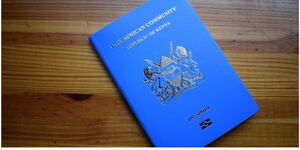A study carried out by Trends & Insights For Africa (TIFA) - an African-based full market research company, between March 15 and March 21, birthed some worrying findings.
The report found that 18% of Kenyans are currently going about their everyday business without taking any form of precaution, despite the outbreak of the deadly Coronavirus.
"18% have not adopted any prevention measures. There is low adoption of social distancing yet this is the main mode that can be used to slow down the spread of COVID-19," reads an excerpt from the report.
According to the official 2019 census data, Kenya's population stood at 47.6 million, which - according to the study - translates to at least 8.4 million Kenyans living in total oblivion.
The researchers drew their data from a sample size of 1,000 Kenyans, who they interviewed via phone calls in a bid to observe the call for social distancing.
"A significant number (16%) of Kenyan adults do not know any of the 5 symptoms of COVID-19," reads a section of the report.
The study further revealed that despite the various measures taken by Health Cabinet Secretary (CS) Mutahi Kagwe to ensure that Kenyans were informed of the various ways one could use to combat the deadly virus such as public sensitisation via various media platforms and availing a hot-line to the public, a huge section of the population is still the dark.
"There are gaps in knowledge and behavioral traits. These present the risk of a surge in the numbers of those infected by the disease," the report further reads.
Crucially, the report also highlighted several myths regarding the virus that has on March 24, infected 25 individuals within the country.
There is a general misconception that symptoms of COVID-19 includes sore throat (2% of Kenyans believe this) whole 1 % of the populous believe that flu-symptoms automatically translate to one having contracted the virus that had brought the entire world to a standstill.
"COVID-19 symptoms include: Fever, Cough, Sneezing, Headache, and difficulty in breathing (symptoms start within 14 days being infected)," the report asserts, echoing World Health Organisation (WHO) guidelines.
The study also cast light on a huge knowledge gap amongst Kenyans, whereby, almost half the population was not aware that one could contract the virus by touching contaminated surfaces, and then going on to touch their eyes, nose or mouth.
"There is an urgent need to increase knowledge and motivate Kenyans to adopt the recommended prevention practices," the report recommended.
The recommended prevention practices are as follows:
1. Washing hands regularly with soap and running water, or use an alcohol-based hand sanitizer.
2. Cough or sneeze into a disposable tissue or flexed elbow, and wash hands immediately.
3. Observe 2 metres social distance with people who have flu-like symptoms.
4. Keep away from people who have flu-like symptoms and avoid travelling.
5. Avoid handshake, hugging or kissing with people with flu-like symptoms.
According to the report, 76% of Kenyans are only employing 2 of the measures recommended by the Health Ministry which still places such individuals at a high risk of contracting Covid-19.
CS Kagwe in a press briefing on March 24, reiterated the need for Kenyans to adhere to any directives issued by the government, in its bid to contain the spread of the virus.
The urgency of observing these protocols has been necessitated by several cases of Kenyans, including government officials failing to observe the 14-day delf-quarantine - which has led to a number of cases of community transmission in Kenya.












